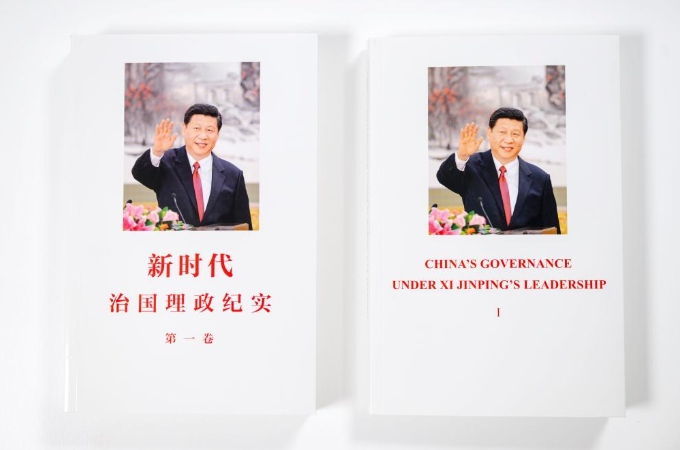BRI could unlock Asia's film distribution potential: 'Antara' producer
Source: China Daily | 2024-03-14 | Editor:Ines

Alexander Amartei, CEO of Amartei Entertainment [PHOTO PROVIDED TO CHINA DAILY]
China's Belt and Road Initiative could positively impact film distribution for Asian and Middle Eastern films and content amid greater engagement that could unlock broader economic potential for the region, according to an award-winning Hollywood producer.
Alexander Amartei, an Irish entrepreneur, Investor, CEO of Amartei Entertainment, told China Daily on the sidelines of the Hong Kong International Film and TV Market (FILMART) on March 11 that the BRI "is linking people in a very high-level way", which he said was "going to be great for the film industry as well".
"Anything that brings people together in the high level usually is the winner. And they're giving a chance and opportunity for neighboring countries that are not so developed to be able to jump on this train of development to be more participative in other industries and improve their economies, benefit from the economy of China and allow them to contribute what they're good at," said Amartei, who is co-producer of Antara, a Saudi Arabia-set epic.
Based on a true story, Antara is a 6th Century Swords and Sandals Epic that tells the true story of Antara Ibn Shaddad, a black slave who won his freedom and became a knight, and one of the most famous poets in ancient Arabia.
"Antara" is the first major movie in history funded by NFTs and would be shot in Saudi's futuristic city, NEOM, under British director Simon West of Lara Croft: Tomb Raider and Con Air, to name a few.
"We're really all about bringing the world together through film, and it's a really interesting time at the moment where the relationship between China and the Middle East and Asia and the Middle East is really good," said Amartei.
"It's not just through trade or infrastructure or technology and collaboration. It's also about movie business, bringing the people together through film and soft power between regions," he added.

Alexander Amartei, CEO of Amartei Entertainment [PHOTO PROVIDED TO CHINA DAILY]
Amartei also noted that the Chinese people "were always very good at manufacturing and infrastructure" and that "it's just in the blood, in the DNA".
After watching award-winning Crouching Tiger, Hidden Dragon, and the setting of the movie being in Wudang Mountain, he was mesmerized, including with the movie's production "with all the elegance and sophistication" from production to the scoring and collaboration. As a young man, he travelled down to Wudang Mountain for his fantastic spiritual enlightenment.
He said it "was a complete gamechanger from the Raymond Chow era", referring to the late Hong Kong film legend, and "from the Jackie Chan era", like kung fu movies in Hong Kong.
"So again, a testament to the power of film. It made China my first cultural romance," said Amartei.
"So I think the Belt and Road Initiative gives people the chance to do what they're good at. Be it in engineering, be it technology, be it the movies. They could have huge new movie champions, like Uzbekistan, for example, you'll never know," said Amartei.
Amartei was hopeful that the BRI could help accelerate film distribution, sharing his friend's experience with owning a delivery company that made four times more money in Kuwait than it did in Egypt even though the latter was bigger in terms of population size.
"What does that say to you? It says that you'll never know. It's not just about the number of people there, of how well a movie might be distributed,"
He said as an example that one may have fewer people in Kazakhstan than they do in Uzbekistan, but "you might make more in distribution for whatever reasons".
"So the Belt and Road Initiative allows us to unlock this potential with all these different countries," said Amartei.
"International cinema is going to take over Hollywood. I think bringing the world together, especially Asians and the Middle East, because inevitably, the West is going to be part of that, to whatever degree because they're also participant in the main region," said Amartei.
"There's a lot of people leaving Europe completely to make a new home in Abu Dhabi or Dubai. Or Saudi. Same with America," he added.
You May Like
-
BRI brings strengthened connectivity for common development,...
The BRI has grown to include over 3,000 projects in 152 countries and regions and is a game changer in transforming the economic competitiveness of its partneri...
InKunming 2023-11-29 -
BRI benefits partner nations with vast opportunities
Pomegranate, introduced to China more than 2,000 years ago from Central Asia, has become a name card for free trade propelled by the Silk Road.
InKunming 2023-11-21 -
BRI paves way for global development, cooperation and inclus...
The China-proposed Belt and Road Initiative (BRI) has paved the way for global economic development, win-win cooperation, and inclusiveness, said Pakistani offi...
InKunming 2023-11-09 -
China Focus: BRI yields fruitful results in China-Pakistan c...
In October, in the Thatta district of southern Pakistan's Sindh province, more than 100 wind turbines are constantly delivering green power to households in the...
InKunming 2023-11-09 -
BRI brings children big dreams for the future
Darling Phoutthachack got up very early on April 17. The 10-year-old was excited to meet his schoolmates at the station in Vientiane, capital of Laos, and begin...
InKunming 2023-10-25 -
Reinvestigation: BRI in 10 years: A catalyst for positive en...
Resources. "A number of projects implemented in Kenya under BRI have positively contributed to environment protection and conservation," said Cavince Adhere
InKunming 2023-10-18 -
BRI ushering in new chapter of China-Cambodia ironclad frien...
The Belt and Road Initiative (BRI) has been ushering in a new chapter for the China-Cambodia ironclad friendship, providing tremendous benefits to both sides, C...
InKunming 2023-10-16 -
Key takeaways from BRI white paper
China's State Council Information Office on Tuesday released a white paper titled "The Belt and Road Initiative: A Key Pillar of the Global Community of Shared ...
InKunming 2023-10-13 -
BRI creates new paradigm for international cooperation: offi...
The Belt and Road Initiative (BRI) has created a new paradigm for international cooperation, rising above the outdated mentality of geopolitical games, a Chines...
InKunming 2023-10-11 -
BRI projects improving lives in developing nations
During the past decade, the Belt and Road Initiative has helped to improve human rights in countries involved in the initiative by boosting international cooper...
InKunming 2023-09-25







